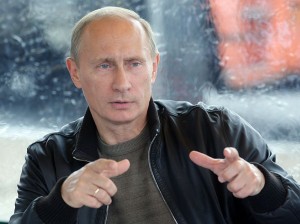Source: Consortium News

The U.S. political-media elites, which twisted themselves into a dangerous "group think" over the Iraq War last decade, have spun out of control again in a wild overreaction to the Ukraine crisis. Across the ideological spectrum, there is rave support for the coup that overthrew Ukraine's elected president -- and endless ranting against Russian President Vladimir Putin for refusing to accept the new coup leadership in Kiev and intervening to protect Russian interests in Crimea.
The "we-hate-Putin" hysteria has now reach the point that former Secretary of State Hillary Clinton has deployed the "Hitler analogy" against Putin, comparing Putin's interests in protecting ethnic Russians in Ukraine with Hitler citing ethnic Germans in Eastern Europe to justify aggression at the start of World War II.
Some Clinton backers suggested she made the provocative comparison to give herself protection from expected right-wing attacks on her for having participated in the "reset" of U.S. policy toward Russia in 2009. She also was putting space between herself and President Barack Obama's quiet effort to cooperate with Putin to resolve crises with Iran and Syria.
But what is shocking about Clinton's Hitler analogy -- and why it should give Democrats pause as they rush to coronate her as their presidential nominee in 2016 -- is that it suggests that she has joined the neoconservative camp -- again. Since her days as a U.S. senator from New York -- and as a supporter of the Iraq War -- Clinton has often sided with the neocons and she's doing so again in demonizing Putin.
Democrats might want to contemplate how a President Hillary Clinton would handle that proverbial "3 a.m. phone call," perhaps one with conflicting information about a chemical weapons attack in Syria or muddled suspicions that Iran is moving toward a nuclear bomb or reports that Russia is using its military to resist a right-wing coup in neighboring Ukraine.
Would she unthinkingly adopt the hawkish neocon position as she often did as U.S. senator and as Secretary of State? Would she wait for the "fog of war" to lift or simply plunge ahead with flame-throwing rhetoric that could make a delicate situation worse?
There's also the question of Clinton's honesty. Does she really believe that Putin protecting ethnic Russians from an illegitimate government that seized power in a right-wing coup on Russia's border is comparable to Hitler invading Austria, Czechoslovakia and Poland?
Media Endorsement
Normally, anyone who uses a Hitler analogy is immediately chastised for both absurd hyperbole and anti-Semitism. Besides the extreme exaggeration involved, the Hitler analogy trivializes the scope of Hitler's crimes both in provoking World War II and carrying out the Holocaust against European Jews.
Usually neocons are among the first to protest this cheapening of the Holocaust's memory, but apparently their determination to take down Putin for his interference in their "regime change" plans across the Middle East caused some neocons to endorse Clinton's Hitler analogy. One of the Washington Post's neocon editorial writers, Charles Lane, wrote on Thursday: "Superficially plausible though the Hitler-Putin comparison may be, just how precisely does it fit? In some respects, alarmingly so."
Yet, outside of this mad "group think" that has settled over Official Washington, Clinton's Hitler analogy is neither reasonable nor justified. If she wanted to note that protecting one's national or ethnic group has been cited historically to justify interventions, she surely didn't have to go to the Hitler extreme. There are plenty of other examples.
For instance, it was a factor in the Mexican-American War in the 1840s when President James Polk cited protecting Texans as a justification for the war with Mexico. The "protect Americans" argument also was used by President Ronald Reagan in justifying his invasion of the Caribbean island of Grenada in 1983. Reagan said he was protecting American students at the St. George's Medical School, even though they were not in any real physical danger.
In other conflicts, human rights advocates have asserted the right to defend any civilians from physical danger under the so-called "responsibility to protect" -- or "R2P" -- principle. For example, neocons and various U.S.-based "non-governmental organizations" have urged a U.S. military intervention in Syria supposedly to protect innocent human life.
However, if anyone dared compare Ronald Reagan or, for that matter, R2P advocates to Hitler, you could expect the likes of Charles Lane to howl with outrage. Yet, when Putin faces a complex dilemma like the violent right-wing coup in Ukraine -- and worries about ethnic Russians facing potential persecution -- he is casually compared to Hitler with almost no U.S. opinion leader protesting the hype.
Who Were the Snipers?
There is also new evidence suggesting that the sniper shootings in Kiev -- a pivotal moment in the uprising to overthrow President Viktor Yanukovych -- may have been the work of neo-Nazi provocateurs trying to foment a coup, not the police trying to stop one.
(Note: You can view every article as one long page if you sign up as an Advocate Member, or higher).





